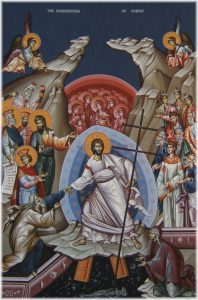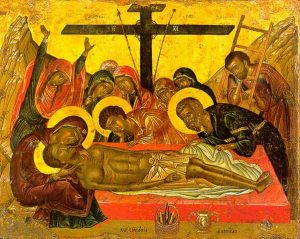“Keep your mind in hell, and despair not.” This admonition from St. Silouan is appropriate for Good Friday, when most of Christendom commemorates Christ’s descent into hell, where he shatters its captives’ chains. Many modern Western theologians have abandoned this teaching, but even if you reject it you are still, if you are a Christian, familiar with the somber reality of this day when man killed God.
It is a grim good day, and because we are hopeful we can’t help but look ahead to Sunday. The joyous music, the nice clothes, the delicious food, reunions with friends and family. The brightness of it.
Even Christian traditions that have eliminated the Lenten fast and abandoned Good Friday commemorations can’t erase the feeling, come Sunday, that we are exiting the tomb with Christ. In spite of ourselves we feel—if only just a little—that we, too, have been resurrected.
And so we look ahead, and in this we are living between already and not yet—in a state where death’s ultimate enslavement of man has been defeated, but when our individual deaths still await us. We see it in the 5th century liturgy of St. John Chrysostom, still celebrated throughout the world:
“Remembering, therefore . . . all that has come to pass for our sake: the Cross, the tomb, the Resurrection on the third day, the ascension into heaven, the enthronement at the right hand of the Father and the second and glorious coming…”
We remember the cross borne for our sakes and we remember the second coming. Already and not yet. It is finished, and, Work out your salvation with fear and trembling.
The Christian faith seems filled with such paradoxes, if we listen for them. What especially dreadful education must take place in a church, for the dogma to be flattened to the point where it has less mystery than a fortune cookie. For its parishioners to imagine that Buddhism, or yoga, or cosmology are deeper by comparison.
Our faith and our God are shrouded in mystery, and yet Paul tells us: “For since the creation of the world His invisible attributes are clearly seen . . .” We clearly see what is invisible, which ought to drive a stake through the heart of every misbegotten materialist apologetic. You don’t reach Christ with graph paper and a protractor.
The paradoxes abound, is the point, but perhaps that has more to do with us than with God. With our own riven spirits. For each of us is the father of the demon-haunted child, saying: “Lord, I believe; help my unbelief!”
Each of us can’t help but believe, and sometimes some of us can’t help but doubt. This is what the world and sin and our own bruised hearts do to us.
The paradox is not in God but in us. In our faulty sight. It’s what makes Escher’s drawings so fascinating, reminding us as they do that our confidence in the abilities of our brains to discern space and time is greater than it should be. And so we are asked to approach the Kingdom with the spirit of childhood, which is to say wonder and humility. The wonder that erupts when our hearts meditate on a stone rolled aside by a man who was dead. The humility that wells up when we consider that he lay in that darkness for us. And further, that we too shall one day go there, whether we like it or not. But we won’t stay there in that darkness.
For the darkness itself is being swallowed up. Already, but not yet.
Lo, now I see Thee willingly submit to death for my sake.
How shall I bury Thee, O my God?
How can I wrap Thee in a shroud?
How can I touch Thy most pure Body with my hands?
What songs can I sing for Thy Exodus, O Compassionate One?
I magnify Thy Passion.
I glorify Thy Burial
and Thy holy Resurrection,
crying: O Lord, glory to Thee!










